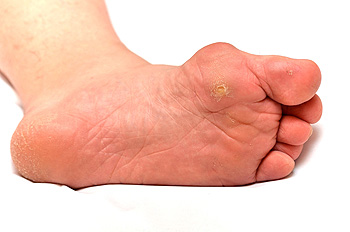Identifying and Treating Seed Corns
Tuesday, 10 December 2024 00:00
Seed corns, medically known as heloma miliare, are small, well-defined areas of thickened skin that typically form on the soles of the feet. These hard, circular spots are often caused by friction, pressure, or dry skin, and they may appear in clusters. Seed corns are distinct from calluses and plantar warts. Calluses are larger and irregularly shaped, while plantar warts disrupt the skin's natural lines and may include tiny dark dots. Though seed corns are typically painless, they can cause some discomfort, especially in weight-bearing areas of the foot. A podiatrist can diagnose seed corns through a foot examination and distinguish them from other conditions. Treatment includes safely trimming the thickened skin to reduce discomfort, as well as addressing underlying factors like wearing ill-fitting shoes or excessive pressure. Podiatrists also provide guidance on preventive measures, such as selecting proper footwear and using orthotic devices to minimize friction. If you have a problematic corn on your foot, it is suggested that you visit a podiatrist for guidance.
Corns can make walking very painful and should be treated immediately. If you have questions regarding your feet and ankles, contact Dr. Steven Schwartz of Pennsylvania. Our doctor will treat your foot and ankle needs.
Corns: What Are They? And How Do You Get Rid of Them?
Corns are thickened areas on the skin that can become painful. They are caused by excessive pressure and friction on the skin. Corns press into the deeper layers of the skin and are usually round in shape.
Ways to Prevent Corns
There are many ways to get rid of painful corns such as:
- Wearing properly fitting shoes that have been measured by a professional
- Wearing shoes that are not sharply pointed or have high heels
- Wearing only shoes that offer support
Treating Corns
Although most corns slowly disappear when the friction or pressure stops, this isn’t always the case. Consult with your podiatrist to determine the best treatment option for your case of corns.
If you have any questions please feel free to contact our offices located in Chambersburg, and Mcconnellsburg, PA . We offer the newest diagnostic and treatment technologies for all your foot and ankle needs.

